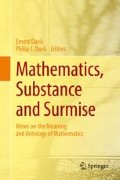Abstract
A poster promoting policy change in Australia’s fisheries, which features a list of seven numbers in its effort to persuade, serves as occasion to do ontology. A performativist analytic is mobilized to show the mutual entanglements of politics and epistemics within which these numbers, agential in policy, come to life. Three distinct types of entanglement are revealed. Numbers have different political valences, and mathematicians need to attend to these in order to act responsibly as mathematicians.
Access this chapter
Tax calculation will be finalised at checkout
Purchases are for personal use only
References
J. L. Austin (1962). How to do things with words: The William James Lectures delivered at Harvard University in 1955, J. O. Urmson & M. Sbisà eds. Oxford: Clarendon Press.
N. Bockstael, A. M. Freeman, R. J. Kopp, P. R. Portney, V. K. Smith (2000) “On measuring Economic Values for Nature” Environmental Science and Technology 34 (2000), pp. 1384-1389.
G. De’ath, J. Lough, and K. Fabricius (2009). “Declining Coral Calcification on the Great Barrier Reef,” Science 323: 116–119.
C. Delgado, (2003). “Fish 2020 Supply and Demand in Changing Global Markets”, International Food Policy Research Institute, Washington D. C.
J. Dewey, The Public and its Problems (1927). Swallow Press, Athens: Ohio University Press, 1954
Pierre Duhem (1996) Essays in the History and Philosophy of Science, Roger Ariew and Peter Barker, trans & ed. Indianapolis: Hackett Publishing Company.
L. Eadie and C. Hoisington, (2011). “Stocking Up: Securing our marine economy” http://cpd.org.au/2011/09/stocking-up/.
R. Frigg and M. Hunter (eds) 2010. “Beyond Mimesis and Convention Representation in Art and Science”, Boston Studies in the Philosophy of Science, Vol. 262. Springer: Springer Science+Business Media.
I. Hacking (1992). “Statistical Language, Statistical Truth, and Statistical Reason: The Self-Authentification of a Style of Scientific Reason” in The Social Dimensions of Science, Notre Dame: Notre Dame University Press.
J. Law (1999). “After ANT. Complexity, naming, and topology” in j. Law and J. Hassard, Actor Network Theory and After, Oxford: Blackwell Publishers.
M. Poovey (1998). A History of the Modern Fact. Problems of Knowledge in the Sciences of Wealth and Society. Chicago: University of Chicago Press.
M. Power and R. Laughlin, (1992). “Critical Theory and Accounting” in Alveson, N. & Willmott, H. (eds), Critical Management Studies, London: Sage.
G. Ryle (1953). “Ordinary language.” The Philosophical Review, 62(2), 167–186. doi:10.2307/2182792
J. Searle (1969). Speech acts. Cambridge: Cambridge University Press. Law in Law and Hassard
S. Shapin and S. Schaffer (1985) Leviathan and the Air Pump. Hobbes Boyle and the Experimental Life, Princeton: Princeton University Press
I. Stengers, (2000). The Invention of Modern Science, trans. Daniel W. Smith, Minneapolis: University of Minnesota Press.
H. R. Verran (2001). Science and an African Logic. Chicago: University of Chicago Press.
H. R. Verran (2012). “Number” in Inventive Methods. The happening of the social, Lisa Adkins and Celia Lury (eds.) London: Routledge Books, pp. 110-124.
L. Wittgenstein, (1953). Philosophical investigations. London: Blackwell.
Author information
Authors and Affiliations
Corresponding author
Editor information
Editors and Affiliations
Rights and permissions
Copyright information
© 2015 Springer International Publishing Switzerland
About this chapter
Cite this chapter
Verran, H. (2015). Enumerated entities in public policy and governance. In: Davis, E., Davis, P. (eds) Mathematics, Substance and Surmise. Springer, Cham. https://doi.org/10.1007/978-3-319-21473-3_18
Download citation
DOI: https://doi.org/10.1007/978-3-319-21473-3_18
Publisher Name: Springer, Cham
Print ISBN: 978-3-319-21472-6
Online ISBN: 978-3-319-21473-3
eBook Packages: Mathematics and StatisticsMathematics and Statistics (R0)

